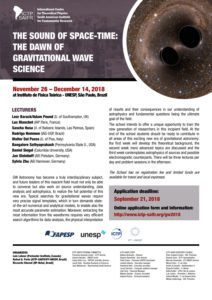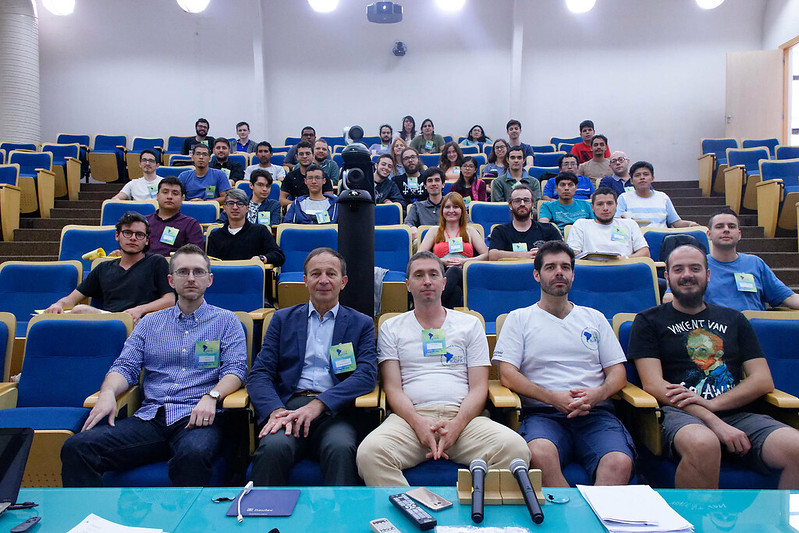- Home
- Lecturers
- Student presentation
- Videos & Files
- Poster
- Photos
- Program
- Additional Information
Home
The direct observation of gravitational waves (GWs) by the LIGO scientific collaboration opened the new science of Gravitational Astronomy. Scientists have compared this to Galileo pointing his telescope to the sky, offering instead an ear to the cosmos. After the remarkable landmark of detection, GW science will soon turn into the study of the properties of the sources and address fundamental questions in astrophysics and cosmology. In particular, binary coalescences are posed to become the leading probe to test gravitational dynamics, and the physics of compact objects under unique conditions and GWs propagation can probe the Universe dynamics on cosmological scale.
GW Astronomy has become a truly interdisciplinary subject, and future leaders of this nascent field must not only be able to converse but also work on source understanding, data analysis and astrophysics, to realize the full potential of this new era. Typical searches for gravitational waves require very precise signal templates, which in turn demands state-of-the-art numerical and analytical models, to enable also the most accurate parameter estimation. Moreover, extracting the most information from the waveforms requires very efficient search algorithms for data-analysis, the physical interpretation of results and their consequences in our understanding of astrophysics and fundamental questions being the ultimate goal of the field.
The school intends to offer a unique opportunity to train the new generation of researchers in this incipient field. At the end of the school students should be ready to contribute in all areas of this exciting new era of gravitational astronomy: the first week will develop the theoretical background, the second week more advanced topics are discussed and the third week contemplates astrophysics of sources and possible electromagnetic counterparts. There will be three lectures per day and problem sessions in the afternoon.
There is no registration fee and and limited funds are available for travel and local expenses.
Organizers:
- Luis Lehner (Perimeter Institute, Canada)
- Rafael A. Porto (ICTP-SAIFR/IFT-UNESP, Brazil)
- Riccardo Sturani (IIP-UFRN, Brazil)
Satisfaction survey:
Lecturers
Click on the titles to read the summaries of the lectures
- Adam Pound (U. of Southampton, UK): Modeling of extreme mass ratio in spirals
- Luc Blanchet (IAP Paris, France): Introduction to the post-Newtonian expansion of General Relativity and analytic modeling of gravitational waves
- Sascha Husa (U. of Balearic Islands, Las Palmas, Spain): Numerical Relativity
- Luis Lehner (Perimeter Institute, Canada): Studying non vacuum spacetimes
- Rodrigo Nemmen (IAG-USP, Brazil): Black Hole (g)astrophysics
- Riccardo Sturani (IIP-UFRN, Brazil): Gravitational waves data analysis
- Daniel Siegel (Columbia University, USA): Multimessenger astronomy
- Jan Steinhoff (AEI Potsdam, Germany): An introductory course on Effective-One-Body formalism and gravitational waveform construction
- Sylvia Zhu (AEI Hannover, Germany): Continous and transient gravitational wave sources
Student presentation
A student presentation session is planned for Wednesday, Dec. 5, 2018, at 3:30 pm. Check below the titles and abstracts.
- Bernardo Araneda (Universidad Nacional de Córdoba, Argentina): On the internal geometry of black hole perturbations
One of the major open problems in mathematical Relativity is the stability of black holes as solutions to the Einstein equations. After a brief review of the different approaches to the problem in its linear regime (Teukolsky, Regge-Wheeler and Zerilli equations, hidden symmetries, etc.), we show that there is an underlying symmetry structure from which all equations can be derived, and that it has its origin in the conformal and complex geometry of the space-time. In particular, this uncovers the geometrical meaning of the Teukolsky connection and of the hidden symmetries associated to Killing spinors and conformal Killing-Yano tensors.
- Pablo Anglada (Universidad Nacional de Córdoba, Argentina): Penrose-like inequality with angular momentum for compact and connected horizons
In axially symmetric space-times it is expected that the Penrose inequality can be strengthened to include angular momentum. In recent works we prove a version of this inequality for compact and connected horizons, more precisely, we obtain a lower bound for the ADM mass in terms of the area, the angular momentum and a particular measure of the surface size. We consider an axially symmetric and asymptotically flat initial data, and use the monotonicity of Hawking’s and Geroch’s quasi-local energy on 2-surfaces along the inverse mean curvature flow.
- Luciano Combi (Instituto Argentino de Radioastronomía, Argentina): First pulsar observations in Argentina and gravitational wave science
The Argentine Institute of Radioastronomy (IAR) is an active research center in astronomy and astrophysics. Originally conceived to perform an HI survey of the galaxy, the Institute has two 30 m single-dish antennas operating at 1400 MHz. In September 2017, after a long period of observational inactivity, technicians and scientist from the IAR have assembled the PuMA collaboration (Pulsar Monitoring in Argentina) with the main goal of using and upgrading the IAR’s radio antennas for pulsar observations. This constitutes the first pulsar observations obtained in South America and the beginning of pulsar science in Argentina. PuMA has been working with north-American institutions such as the RIT and the NANOgrav collaboration, which is currently leading the field in pulsar timing array techniques to detect gravitational waves at very low frequencies. In this work, we show the latest developments of the PuMA project and the daily observation campaign of the millisecond pulsar J0437-4715 that would be relevant for gravitational wave science.
- Thiago Assumpçao (UFABC, Brazil): Acoustic binary black holes
Analogue Models of Gravity have proven to be a useful method to simulate general relativistic effects in the laboratory. In the context of fluid dynamics, the analogue of a black hole is an acoustic black hole, which constitutes a region in the fluid flow from which soundwaves cannot escape. There is a well-established mathematical relationship between perturbations in fluids and scalar perturbations in curved spacetimes. This gives rise to an effective metric, which can be used to explore some gravitational effects in the laboratory. In this presentation, I will introduce the concept of superradiant scattering with the so-called “draining bathtub” geometry. Lastly, I will show some recent developments in the field, such as the numerical evolution of scalar fields and the behavior of null geodesics on top of a binary acoustic black hole background.
- Yolbeiker Rodríguez Baez (Universidad Federico Santa María, Chile): Quasinormal modes of higher dimensional black holes
Perturbative analyses of four-dimensional black hole spacetime have provided useful tools for the investigation of fundamental problems, such as the stability and uniqueness of black holes. This is a very important property for higher dimensional theories, since in higher than four dimensions there is no uniqueness theorem, stability may be the criteria which will select physical solutions among a variety of “black objects”. An extension of the formalism to higher dimensions would be quite useful for the investigation of fundamental problems as well as phenomenological problems in higher-dimensional gravity theories. We will study the quasinormal modes of Schwarzschild-like black holes, which arise in higher dimensions when we consider only the last term of Lovelock’s action in certain dimensions.
Videos & Files
The Sound of Space-time: The Dawn of Gravitational Wave Science
Adam Pound (U. of Southampton, UK): Modeling of extreme mass ratio in spirals
– Lecture 1
– Lecture 2 Exercises 1 – Exercises 2
– Lecture 3 Notes 1 – Notes 2 – Notes 3 – Notes 4 – Notes 5 – Notes 6
– Lecture 4 References on EMRI modelling
– Lecture 5
– Lecture 6
Luc Blanchet (IAP Paris, France): Introduction to the post-Newtonian expansion of General Relativity and analytic modeling of gravitational waves
– Lecture 1
– Lecture 2
– Lecture 3 Slides
– Lecture 4
– IFT Colloquium
– Lecture 5
Riccardo Sturani (IIP-UFRN, Brazil): Gravitational waves data analysis
– Lecture 1
– Lecture 2 Notes 1
– Lecture 3
Sascha Husa (U. of Balearic Islands, Las Palmas, Spain): Numerical Relativity
– Lecture 1 Slides 1 – Slide 2 – Slide 3
– Lecture 2 Tutorial
– Lecture 3 Hands-on
– IFT Colloquim Slide Colloquium
– Lecture 4 Files Complete
– Lecture 5
Rodrigo Nemmen (IAG-USP, Brazil): Black Hole (g)astrophysics
– Lecture 1
– Lecture 2
– Lecture 3 Files Complete (Slide 1,2,3,4,5)
– Lecture 4
– Lecture 5
Jan Steinhoff (AEI Potsdam, Germany): An introductory course on Effective-One-Body formalism and gravitational waveform construction
– Lecture 1
– Lecture 2
– Lecture 3 Files Complete (Slide 1,2,3,4,5)
– Lecture 4
– Lecture 5
Daniel Siegel (Columbia University, USA): Multimessenger astronomy
– Lecture 1 Notes 1
– Lecture 2 Slide 1 ,2
– Lecture 3 Slide 3 ,4
– Lecture 4 Slide 5
– IFT – Colloquium
– Lecture 5
Sylvia Zhu (AEI Hannover, Germany): Continous and transient gravitational wave sources
– Lecture 1
– Lecture 2
– Lecture 3 Files Complete (Slide 1,2,3,4,5)
– Lecture 4
– Lecture 5
Luis Lehner (Perimeter Institute for Theoretical Physics): Non-vacum spacetimes & strong gravity
– Lecture 1 Slide 1
– Lecture 2 Slide 2
– Lecture 3 Slide 3 e 4
– Lecture 4 Slide 5
– Lecture 5
Poster

Online application is now closed
Photos
Program
Additional Information
Registration: ALL participants should register. The registration will be on November 26 at the institute at 09:00 am.
List of Participants: Updated on November 27, 2018.
Accommodation: Participants and Speakers whose accommodation has been provided by the institute will stay at The Universe Flat. Each participant/speaker, whose accommodation has been provided by the institute, has received the accommodation details individually by email.
How to reach the Institute: The workshop will be held at ICTP South American Institute, located at IFT-UNESP, which is across the street from a major bus and subway terminal (Terminal Barra Funda). The address which is closer to the entrance of the IFT-UNESP building is R. Jornalista Aloysio Biondi, 120 – Barra Funda, São Paulo. The easiest way to reach us is by subway or bus, please find instructions here.
Ground transportation instructions:
Ground transportation from Guarulhos Airport to The Universe Flat
Ground transportation from Congonhas Airport to the Universe Flat
Ground transportation from The Universe Flat to the institute


